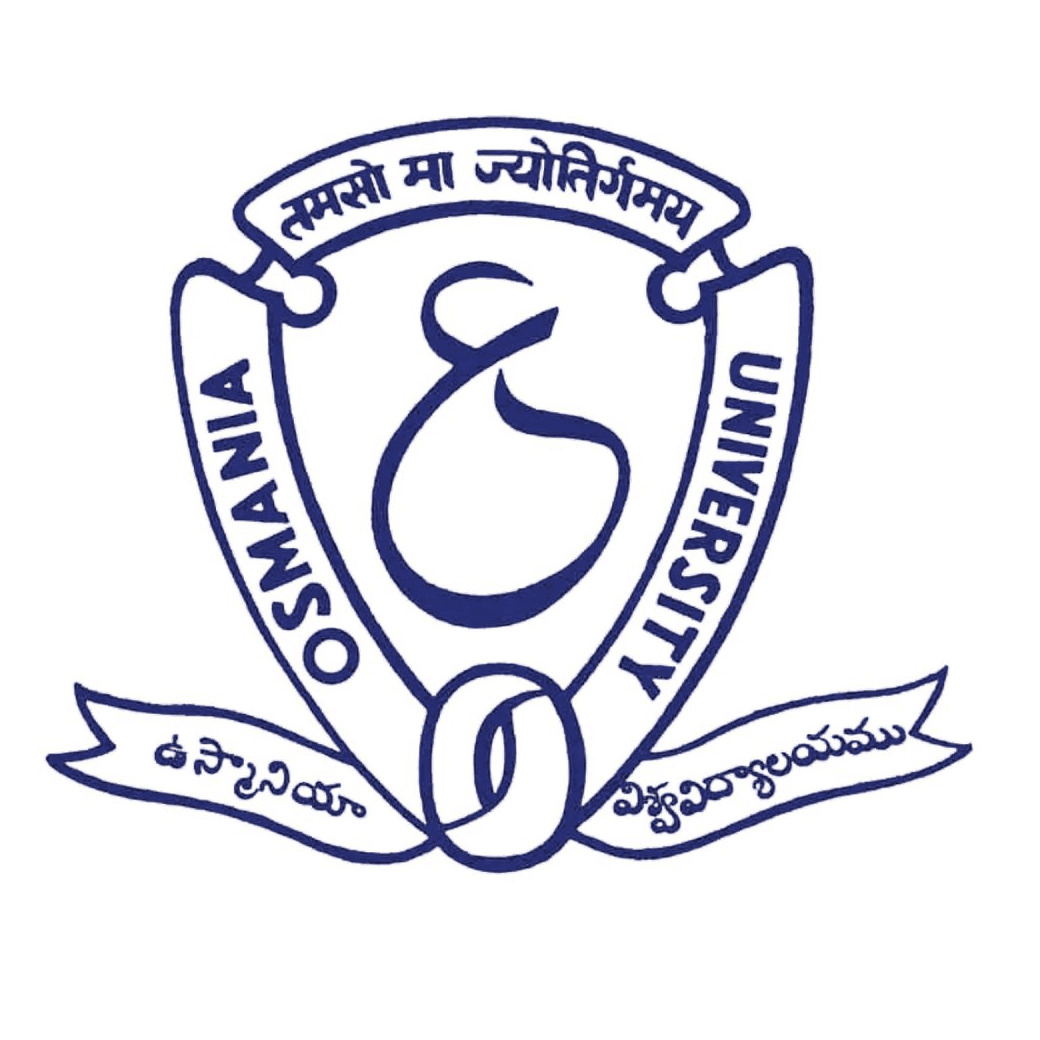
Osmania University

C. P. Radhakrishnan (Chancellor)
Summary
Osmania University, a public state university located in Hyderabad, Telangana, India, was established on 29 August 1917 by Mir Osman Ali Khan, the 7th Nizam of Hyderabad. It is the third oldest university in southern India and the first to be established in the erstwhile Kingdom of Hyderabad. The university initially used Urdu as its medium of instruction, making it the first Indian university to do so, with English as a compulsory subject. As of 2012, it hosts 3,700 international students from over 80 nations. Osmania University is one of the largest university systems in the world, with over 300,000 students across its campuses and affiliated colleges.
Osmania University offers a wide array of courses across various fields such as Humanities, Arts, Sciences, Social Sciences, Law, Engineering, Medicine, Technology, Commerce, Business Management, Information Technology, and Oriental Languages. The university includes notable constituent colleges like Nizam College, Post Graduate College of Law, University College for Women, and several engineering colleges. Additionally, it has numerous autonomous centres and affiliated engineering colleges spread throughout the Greater Hyderabad Municipal Corporation area. The College of Engineering and the College of Law are particularly esteemed, consistently ranking among the top institutions in India.
In terms of rankings, Osmania University has received recognition both nationally and internationally. In 2023, it was ranked 64th overall and 36th among universities in India by the National Institutional Ranking Framework (NIRF). Globally, the QS World University Rankings 2023 placed it in the 1201-1400 bracket, while it ranked 401-450 among Asian universities. The Times Higher Education World University Rankings 2023 also positioned it within the 1201-1500 range worldwide and 301-350 in Asia. The university is accredited by the National Assessment and Accreditation Council (NAAC) with an 'A+' grade and has been conferred the status of 'University with Potential for Excellence' by the University Grants Commission (UGC).
History
Osmania University, situated in Hyderabad, Telangana, India, stands as a historic and prestigious institution. It was established on 29 August 1917 by Mir Osman Ali Khan, the 7th Nizam of Hyderabad. This founding marked a pivotal moment in the educational landscape of southern India, making it the third oldest university in the region and the first in the former Kingdom of Hyderabad.
The idea behind Osmania University was to modernise education in the state. Mir Osman Ali Khan aimed to create an institution that made higher education accessible to the people of Hyderabad. A significant aspect of this vision was the decision to use Urdu, the state's language, as the medium of instruction. This made Osmania University the first university in India to adopt an Indian language for higher education, a move intended to make learning more inclusive and relevant to the local populace.
In its early years, Osmania University focused on establishing a strong academic base. The university began with a few faculties and departments, steadily expanding its range of subjects. Initially, the courses offered were in traditional disciplines such as Arts, Sciences, and Humanities. The university quickly earned a reputation for its rigorous academic standards, becoming a notable centre of learning in the region. The emphasis was on providing a well-rounded education that combined traditional knowledge with modern scientific and technological advancements.
By the mid-20th century, Osmania University had incorporated several constituent and affiliated colleges. Nizam College, a prominent institution, became part of the university in 1947. The College of Law, known for its distinguished faculty and alumni, also became a part of Osmania University. In 1929, the University College of Engineering was established, becoming one of India's oldest engineering colleges. These colleges played a crucial role in shaping the academic environment of the region and produced many notable alumni who made significant contributions in various fields.
After India gained independence, Osmania University continued to expand. New faculties and departments were added to meet the increasing demand for higher education. In 1962, the Osmania University College for Women was established, reflecting the university's commitment to providing education to all segments of society. The introduction of postgraduate courses and research programmes further enhanced the university's academic standing. Osmania University also set up several research centres and institutes, focusing on various disciplines and fostering a culture of academic inquiry and innovation.
A significant milestone in the university's history was its recognition as a 'University with Potential for Excellence' by the University Grants Commission (UGC) in the early 21st century. This recognition highlighted the university's ongoing commitment to academic excellence and research. Additionally, the National Assessment and Accreditation Council (NAAC) awarded the university an 'A+' grade, reinforcing its status as a leading institution of higher learning.
In recent years, Osmania University has worked to broaden its global presence. The university has established collaborations with numerous international universities and institutions, facilitating student and faculty exchanges, joint research projects, and academic partnerships. These efforts to internationalise its programmes have attracted a diverse student body, including over 3,700 international students from more than 80 countries as of 2012.
Osmania University has consistently been ranked among the top universities in India. According to the National Institutional Ranking Framework (NIRF) 2023, it was ranked 64th overall and 36th among universities in India. Internationally, the QS World University Rankings 2023 placed it in the 1201-1400 bracket, while it ranked 401-450 among Asian universities. The Times Higher Education World University Rankings 2023 also positioned it within the 1201-1500 range worldwide and 301-350 in Asia.
Courses
Osmania University presents a diverse range of courses spanning multiple disciplines, ensuring a well-rounded academic experience for its students. The curriculum is meticulously crafted to impart both theoretical knowledge and practical skills, equipping graduates for successful professional pursuits.
At the undergraduate level, Osmania University offers Bachelor’s degrees in Arts, Science, Commerce, Engineering, Law, and Social Sciences. The Bachelor of Arts (BA) programme features majors including English, History, Political Science, and Economics. Likewise, the Bachelor of Science (BSc) offers specialisations in Physics, Chemistry, Mathematics, Botany, and Zoology. For those inclined towards commerce and business, the Bachelor of Commerce (BCom) programme delivers a robust foundation in accounting, finance, and business management. The university’s esteemed engineering college, one of the nation's oldest, provides Bachelor of Engineering (BE) degrees in Civil, Mechanical, Electrical, Electronics and Communication, and Computer Science Engineering. Additionally, the Bachelor of Laws (LLB) programme delves into various facets of legal studies, preparing students for esteemed careers in law and judiciary.
For postgraduate scholars, Osmania University offers Master’s degrees across a diverse spectrum of subjects. The Master of Arts (MA) and Master of Science (MSc) programmes enable students to delve deeper into their chosen fields of study. The Master of Commerce (MCom) programme delves into advanced topics in commerce and finance, while the Master of Business Administration (MBA) and Master of Computer Applications (MCA) programmes offer industry-oriented curricula highly coveted by aspiring professionals. Moreover, the university's postgraduate engineering courses (ME/MTech) provide advanced specialisations in various engineering disciplines.
Osmania University is also renowned for its doctoral (PhD) programmes, fostering original research and innovation across all faculties. Backed by exceptional infrastructure and support from research centres and institutes, doctoral candidates thrive in an environment conducive to scholarly exploration.
Furthermore, Osmania University extends its offerings to diploma and certificate courses tailored for professional growth and skill enhancement. These encompass programmes in languages, computer applications, and management, among others. Additionally, the university reaches out to a wider audience through its Centre for Distance Education, ensuring the accessibility of higher education to aspiring learners.
Global MBA rankings
- Osmania University is ranked 1201-1400 in the QS World University Rankings 2024.
- According to Times Higher Education, it holds the position of 1201 in the World University Rankings.
- In the Best Global Universities ranking, Osmania University is placed at 1821.
Job integration rate
The placement record at Osmania University is impressive, with almost 90 to 95% of students securing jobs or internships. In 2023, a total of 243 students found placements, facilitated by the participation of 36 prominent companies. Companies like Mathworks, De SHAW, Fanatics, and Darwinbox were among the top recruiters at Osmania University in 2023.
General information
- Osmania University| Wikipedia
- OSMANIA UNIVERSITY| X
- Osmania University Employees, Locations, Alumni| LinkedIn
- Osmania University| Origin and History
- Osmania University (OU): Admission 2024| Collegedunia
- Osmania University| Instagram
- New primary cell culture facility opened in Osmania University| The New Indian Express
- Osmania University - Rankings & Reviews| Masters Portal
- OSMANIA UNIVERSITY: Rankings, Fees & Courses Details| Top Universities
- Osmania University in India| U.S. News & World Report
- Osmania University | World University Rankings | Times Higher Education
Explore the latest data on Business, Industry Leaders and Influencers, Organizations, Education, and Investors to stay informed and ahead.

C. P. Radhakrishnan (Chancellor)
